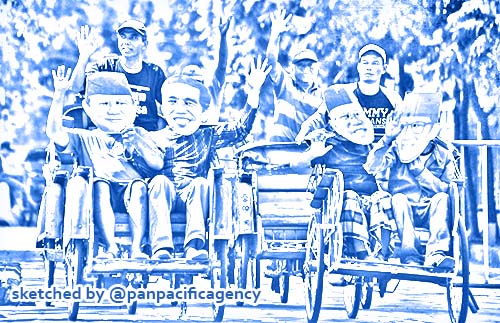Most indonesians consider 2019 elections ‘Honest and Fair’: survey

Residents of Solo, Central Java, ride pedicabs while wearing masks of presidential candidate pair Joko 'Jokowi' Widodo and Ma'ruf Amin and challengers Prabowo Subianto and Sandiaga Uno before the April 17 elections. (Antara Photo/Maulana Surya). Sketched by the Pan Pacific Agency.
JAKARTA, Jun 17, 2019, Jakarta Globe. A recent survey shows more than two thirds of Indonesians believe the April 17 presidential and legislative elections were fair. “The assumption that the 2019 elections were not fair does not correspond with what most Indonesian citizens believe,” Sirojudin Abbas, program director at Saiful Mujani Research and Consulting (SMRC), said on Sunday, reported the Jakarta Globe.
The survey was conducted among 1,220 randomly selected respondents, aged 17 years and over or married, in 34 provinces between May 20 and June 1. The SMRC got valid responses in face-to-face interviews from 1,078 respondents, or 88 percent.
At least 68 percent said they believed the recent elections were conducted fairly, while up to 28 percent considered otherwise. The remainder were unsure.
This survey was part of the pollster’s long-term, self-funded research program.
It coincided with one of the most violent episodes in the aftermath of this year’s elections, when a mass protest in Central Jakarta by supporters of losing candidate Prabowo Subianto, who has so far refused to concede, resulted in deadly violence.
Prabowo is currently challenging the result in the Constitutional Court, arguing that the elections were tainted by massive and systematic fraud. But most Indonesians beg to differ.
“In 2009, 67 percent of people considered the general election fair, and in 2014, it was 70.7 percent,” Sirojudin said, noting a stable trend in public confidence in the country’s past three elections.
The survey also found that most people were positive about the prospects of democracy in Indonesia. About 66 percent indicated that they were satisfied with the quality of Indonesia’s democracy, while 77 percent believed President Joko “Jokowi” Widodo’s governance was democratic.
Sirojudin said 82 percent of respondents considered democracy the best form of government, while 86 percent believed democracy was suitable for Indonesia. Moreover, 91 percent considered the freedom to criticize the government important.
“Since 2012, overall there was an increase in commitment and preference for democracy. For example, in June 2012, only 56 percent voted for democracy. Now it is peaking at 82 percent. This means public preference for democracy has strengthened. This is a very satisfying sign,” he said.
However, the survey also shows a decline in public confidence in some indicators of the quality of democracy. Forty-three percent of respondents admitted to being afraid to talk about politics, while 28 percent said the government often ignores the Constitution.
Furthermore, 38 percent said they feared unlawful conduct by law enforcement agencies, 21 percent claimed to be afraid to join political organizations, and 25 percent said they were afraid to openly practice their religion.
Sirojudin also noted that 33 percent of respondents believed the political situation in Indonesia was deteriorating, compared with 20 percent in 2014.